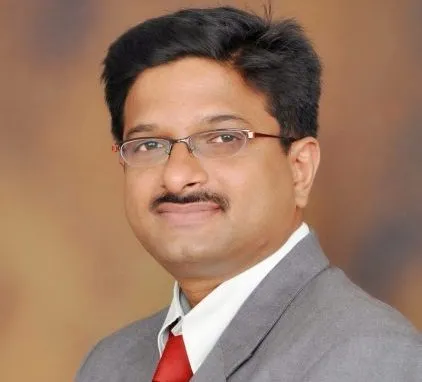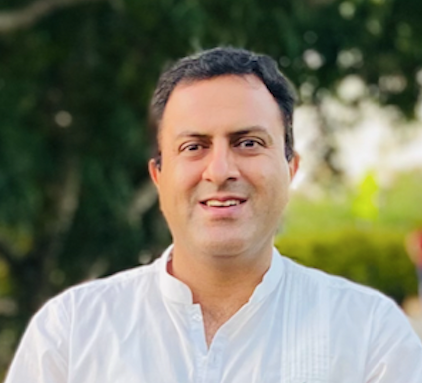The THRIVE project would like to extend warm gratitude to Dr. Satish Jeevannavar and Dr. Muhammad Abbas for their presentations at the March Thrivability Matters webinar. The theme of this webinar was the United Nations Sustainable Development Goal (SDG) 3- Good Health and Well-being. Satish spoke about the importance of equitable healthcare for all, and the impact of COVID-19 on achieving SDG3. Muhammad presented on the topic of increasing innovation and accessibility in the pharmaceuticals industry.
About our speakers

Dr. (Maj) Satish Jeevannavar is a physician, Ex-army medical corps officer, and alumnus of IIM Bangalore with over 20 years experience across scaling startups in Primary Healthcare, mHealth, Pharma & Life Science Strategy Consulting in India, APAC & Emerging Markets.

Dr. Muhammad Zaheer Abbas, Chief Investigator with the Australian Centre for Health Law Research (ACHLR), is a Sessional Academic at the Faculty of Business and Law, Queensland University of Technology (QUT), Brisbane, Australia. He has undertaken extensive research on the public health dimensions of intellectual property laws.
Summary of the webinar
Dr. Satish Jeevannavar on the topic of Universal Healthcare For All
Satish began his presentation by walking the audience through the journey of primary healthcare. Primary healthcare commits to the concept of ‘health for all’, declaring that accessible health is a fundamental human right. It has been shaped up in the modern world as “universal healthcare”. Following the industrial revolution, there has been an increasing trend of lifestyle disorders, now commonly referred to as Non-Communicable Diseases (NCD). This term covers the entire spectrum of cardiovascular disorders, among others. In the modern-day, half of the world’s population still lacks access to equitable health care. Satish stressed the fact that your ZIP code can carry more weight on potential health outcomes than your genetic code. Your geographic location is inherent in how you grow, live, work and age.
Location is part of the Social Determinants of Health, with other factors including gender, race, socioeconomic status, and age. 94% of COVID-19 deaths occur in the over 60 age group. Satish shared an interesting analogy of the increased prevalence of iPhone 13 distribution to both emerging and developed countries. He questions why this is not the case for health care, and why its disparity persists. For the first time in twenty years, the global extreme poverty rate has increased. COVID-19 has exposed and intensified inequalities within and among countries. Satish stressed the importance of policymakers, who must renew their focus on universal healthcare as a starting point for improved health outcomes for all.
Satish went on to point out that the SDGs are interconnected, such as global health and climate change. Climate change can increase the prevalence of waterborne diseases, while carbon emissions increase the burden of respiratory illness. This disproportionately affects developing countries. Only 1% of global health funding is dedicated to preventing non-communicable diseases in low- and middle-income countries. Despite that, these diseases are accountable for 67% of deaths there.
In order to better prevent these diseases, many factors can be improved. Among these are increased access to rural regions, foundational investments, and more community health workers. Another strategy in reducing non-communicable diseases is the World Health Organization’s ‘best buys’. These are strategic responses aimed at reducing disease. It includes practices that reduce alcohol and tobacco use and encourage healthy lifestyle choices.
His presentation and conclusion can be seen here.
Dr. Muhammad Zaheer Abbas on the topic of Access To Innovation For Achieving SDG3
Muhammad began his presentation by stressing the importance of innovation and how it is important in achieving the 2030 Agenda’s goal of improving the health and well-being of all people of all ages. He also highlighted the notion of innovation failures in today’s society. Drug companies are heavily focused on risk-free and less-costly incremental innovations which are not value-adding. Muhammad emphasized that drug companies focus more on their monetary benefits rather than the health needs of the population. This restricts access to medicine.
Drug companies invest in research and development efforts targeted at profit maximization rather than improving health outcomes. Often, pharmaceutical companies will engage in evergreening. This is the process of extending patents in order to retain market exclusivity. This is done at the expense of people everywhere. It means that drugs will be more expensive and harder to access. It also means that drug companies prioritize incremental innovations and less financial risks over genuine innovation. In order to address these issues, patentability criteria must be overhauled. Public health must be taken into account in these choices.
Muhammad went on to cover the topic of tropical diseases. Diseases are abundant in developing and especially tropical countries. Examples of these are ebola, zika, and yellow fever. The manufacturing of drugs for these diseases is not prioritized because of less financial gains. It is estimated that only 10% of global health research is devoted to conditions that account for 90% of the global disease burden.
Muhammad offered some ways this could be improved. Pharmaceutical companies could delink research and development from sales and profit. An open-source approach could be taken to drug discovery so that various teams can work together and share progress. These cut down on duplication of effort and reduce the time and cost of discovering drugs. Research grants and innovation prizes can be used to motivate the creation of pharmaceuticals that would not normally result in a high profit. However, grants have been criticized as prone to corruption and politicization. As a result, this approach is unlikely to completely replace the patent system. Taxpayers might also be resistant to funding globally available drugs. To this, Muhammad suggested a binding international research and development treaty be introduced. This would be transparent and ensure that all capable countries are working together.
His presentation and conclusion can be seen here.
CONCLUSION
To summarise the above points made by Satish and Muhammad, it is necessary for policymakers to change their efforts to strive for better health outcomes and eliminate the persisting disparity between emerging and developed countries. In order to achieve universal healthcare, pharmaceutical companies need to change with the times.
Following the webinar, guests were invited to participate in an interactive Q&A in which Satish and Muhammad answered questions from the audience.
If you missed out on the presentation, you can view the recording on our youtube channel.
Make sure to register for April’s webinar here or find out more info here.
Thanks, and do keep on thriving!
SUBSCRIBE TO OUR NEWSLETTER
GOT A QUESTION ON THIS TOPIC?